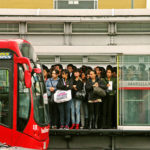Posts in the 'Urban Governance' category
For all the buzz that tactical urbanism has received in the past several years, there’s still a lack of public consensus about the movement’s exact meaning, impact, and potential for change. Mike Lydon and Anthony Garcia, Principals of Street Plans ...

Editor’s note April 14, 2015: This article was updated to include a reference to the Bus Rapid Transit Centre of Excellence. The world has never been more urban than it is now, and this trend isn’t expected to slow down ...

Consensus is building around the many benefits of compact cities. Overall, compact cities use fewer resources, produce fewer carbon emissions, and provide better quality of life for their inhabitants than their sprawled counterparts. In rapidly urbanizing countries in the global ...

China’s top-down system of decision-making has been the root of many transformative changes in the past. So why has it recently been so hard to rally city leaders behind low-carbon transport? The answer has two sides: institutional complexity and lack ...

This summer, Indian Prime Minister Narendra Modi announced plans to build ‘100 smart cities’ across India in an effort to take advantage of the country’s recent urban boom and catalyze investment in Indian cities. His initiative will cost the government 1.15 ...

How can we ensure that all urban inhabitants have the necessary rights and conditions for a dignified and secure existence in the city? As the world rapidly urbanizes, the livelihoods, health, and safety of residents living in informal settlements remain ...

TheCityFix, produced by EMBARQ, is excited to announce the launch of the WRI Ross Center for Sustainable Cities, which will focus on research, tools, and on-the-ground action to develop accessible, healthy, equitable, and environmentally friendly cities. The Center will build ...

Few urban policies have been as contentious or as fruitful as congestion pricing. Congestion pricing is a travel demand management policy that charges a fee for vehicles that enter a certain urban area or a certain street during specific periods ...

EMBARQ, the sustainable urban transport and urban development program of the World Resources Institute (WRI), and the World Bank are co-organizing Transforming Transportation on January 16 and 17 in Washington, D.C. Join the conversation on social media with hashtag #TTDC14, by following @EMBARQNetwork and @wbsustaindev on Twitter, ...

Last Tuesday on TheCityFix we shared Part I of our interview with Dr. V. Setty Pendakur, Founding Chair of the Transportation in Developing Countries committee at the Transportation Research Board (TRB). Last week, Dr. Pendakur discussed why sustainable transport is so ...

The inclusion of all stakeholders in urban planning was a recurring theme yesterday at the U.N. Commission on Sustainable Development event, “Sustainable Transport and Infrastructure Policies in Latin America,” organized by the U.N. Economic Commission for Latin America and the Caribbean ...




















